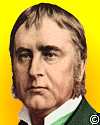 (source)
(source)
|
Sir William Withey Gull
(31 Dec 1816 - 29 Jan 1890)
English physician who coined a new term, Anorexia Nervosa (1874), for a “nervous loss of appetite,” first described by physician, Richard Morton (1689). Gull believed in minimal use of drugs, but supported the use of vivisection in research.
|
Science Quotes by Sir William Withey Gull (34 quotes)
[You are] A healthy man out of health.
— Sir William Withey Gull
Told to cheer and encourage an over-anxious patient, as stated by the Editor in Preface to Sir William Withey Gull and Theodore Dyke Acland (ed.), A Collection of the Published Writings of William Withey Gull (1896), xvii.
A little learning is a dangerous thing;—not if you know how little it is.
— Sir William Withey Gull
In Sir William Withey Gull and Theodore Dyke Acland (ed.), A Collection of the Published Writings of William Withey Gull (1896), lxvi.
Can we separate object and subject? Myself is nothing but a part of my body, my body is nothing but a part of my food, my food is nothing but a part of the earth, the earth is nothing but a part of the solar system.
— Sir William Withey Gull
In Sir William Withey Gull and Theodore Dyke Acland (ed.), A Collection of the Published Writings of William Withey Gull (1896), lii.
Darwin deals with evolution, not with origin.
— Sir William Withey Gull
In Sir William Withey Gull and Theodore Dyke Acland (ed.), A Collection of the Published Writings of William Withey Gull (1896), lvii.
Education is not learning, but the training of the mind that it may learn.
— Sir William Withey Gull
In Sir William Withey Gull and Theodore Dyke Acland (ed.), A Collection of the Published Writings of William Withey Gull (1896), lxii. (by typo, shown on the age as xlii).
Fools and savages explain ; wise men investigate.
— Sir William Withey Gull
One of Gull’s favorite sayings, as given by the Editor in Preface to Sir William Withey Gull and Theodore Dyke Acland (ed.), A Collection of the Published Writings of William Withey Gull (1896), xvi.
Gravitation is demonstrable by leaving a body unsupported.
— Sir William Withey Gull
In Sir William Withey Gull and Theodore Dyke Acland (ed.), A Collection of the Published Writings of William Withey Gull (1896), xlix.
I believe that, as men occupied with the study and treatment of disease, we cannot have too strong a conviction that the problems presented to us are physical problems, which perhaps we may never solve, but still admitting of solution only in one way, namely, by regarding them as part of an unbroken series, running up from the lowest elementary conditions of matter to the highest composition of organic structure.
— Sir William Withey Gull
From Address (7 Aug 1868), the Hunterian Oration, 'Clinical Observation in Relation to medicine in Modern Times' delivered to a meeting of the British Medical Association, Oxford. Collected in Sir William Withey Gull and Theodore Dyke Acland (ed.), A Collection of the Published Writings of William Withey Gull (1896), 4.
If every drug in the world were abolished a physician would still be a useful member of society.
— Sir William Withey Gull
As quoted in Sir William Withey Gull and Theodore Dyke Acland (ed.), A Collection of the Published Writings of William Withey Gull (1896), xxv.
If I do not understand a thing, I keep it before me and I wait.
— Sir William Withey Gull
Gull’s restatement of a Newton quote, as given by the Editor in Preface to Sir William Withey Gull and Theodore Dyke Acland (ed.), A Collection of the Published Writings of William Withey Gull (1896), xvi.
It may truly be said that the eye as much touches the most distant star as that my fingers touch the pen with which I write.
— Sir William Withey Gull
In Sir William Withey Gull and Theodore Dyke Acland (ed.), A Collection of the Published Writings of William Withey Gull (1896), xlviii.
Knowledge = relation.
Explanation = classification.
The outward world a hieroglyph.
Explanation = classification.
The outward world a hieroglyph.
— Sir William Withey Gull
In Sir William Withey Gull and Theodore Dyke Acland (ed.), A Collection of the Published Writings of William Withey Gull (1896), lii.
Medicine is essentially a learned profession. Its literature is ancient, and connects it with the most learned periods of antiquity; and its terminology continues to be Greek or Latin. You cannot name a part of the body, and scarcely a disease, without the use of a classical term. Every structure bears upon it the impress of learning, and is a silent appeal to the student to cultivate an acquaintance with the sources from which the nomenclature of his profession is derived.
— Sir William Withey Gull
From Address (Oct 1874) delivered at Guy’s Hospital, 'On The Study of Medicine', printed in British Medical journal (1874), 2, 425. Collected in Sir William Withey Gull and Theodore Dyke Acland (ed.), A Collection of the Published Writings of William Withey Gull (1896), 11.
Never forget that it is not a pneumonia, but a pneumonic man who is your patient.
— Sir William Withey Gull
In Sir William Withey Gull and Theodore Dyke Acland (ed.), A Collection of the Published Writings of William Withey Gull (1896), xxiii.
Newton’s and Darwin’s world were different from the worlds of most men, and yet their worlds were not the world, but more and better than mine, as they had followed out further and better the teachings of the sense.
— Sir William Withey Gull
In Sir William Withey Gull and Theodore Dyke Acland (ed.), A Collection of the Published Writings of William Withey Gull (1896), xlviii.
Nursing has sometimes been made a trade, sometimes a profession; it will never be what it should be until it is made a religion.
— Sir William Withey Gull
As quoted in Sir William Withey Gull and Theodore Dyke Acland (ed.), A Collection of the Published Writings of William Withey Gull (1896), xxx.
Science and common sense differ as cultivated fruits differ from wild fruits. Science sows its seeds of inquiry, and gathers the fruit. Common sense picks the fruit, such as it, is by the wayside. Common sense has no fields or orchards of knowledge.
— Sir William Withey Gull
In Sir William Withey Gull and Theodore Dyke Acland (ed.), A Collection of the Published Writings of William Withey Gull (1896), lvi.
Science continually though gradually adds to our consciousness of life; but for full knowledge we are “infants in the dark.”
— Sir William Withey Gull
In Sir William Withey Gull and Theodore Dyke Acland (ed.), A Collection of the Published Writings of William Withey Gull (1896), liv.
Study the hindrances, acquaint yourself with the causes which have led up to the disease. Don’t guess at them, but know them through and through if you can; and if you do not know them, know that you do not, and still inquire. “Cannot” is a word for the idle, the indifferent, the self-satisfied, but it is not admissible in science. “I do not know” is manly if it does not stop there, but to say “I cannot” is a judgment both entirely illogical, and in itself bad as favouring rest in ignorance.
— Sir William Withey Gull
In Sir William Withey Gull and Theodore Dyke Acland (ed.), A Collection of the Published Writings of William Withey Gull (1896), lix.
The antithesis of faith is inquiry.
— Sir William Withey Gull
In Sir William Withey Gull and Theodore Dyke Acland (ed.), A Collection of the Published Writings of William Withey Gull (1896), lxiv.
The first principle for the student to recognise, and one to which in after life he will often have to recur, is that his work lies not in the fluctuating balance of men’s opinion, but with the unchangeable facts of nature.
— Sir William Withey Gull
From Address (Oct 1874) delivered at Guy’s Hospital, 'On The Study of Medicine', printed in British Medical journal (1874), 2, 425. Collected in Sir William Withey Gull and Theodore Dyke Acland (ed.), A Collection of the Published Writings of William Withey Gull (1896), 4.
The motto in the pursuit of knowledge, of whatever kind, has always been, “Hope all things;—Prove all things.”
— Sir William Withey Gull
From Address (Oct 1874) delivered at Guy’s Hospital, 'On The Study of Medicine', printed in British Medical journal (1874), 2, 425. Collected in Sir William Withey Gull and Theodore Dyke Acland (ed.), A Collection of the Published Writings of William Withey Gull (1896), 5.
The particles of a dew-drop and the masses of a planet are moulded and controlled by the same force.
— Sir William Withey Gull
From Address (Oct 1874) delivered at Guy’s Hospital, 'On The Study of Medicine', printed in British Medical journal (1874), 2, 425. Collected in Sir William Withey Gull and Theodore Dyke Acland (ed.), A Collection of the Published Writings of William Withey Gull (1896), 109.
The road to a clinic goes through the pathologic museum and not through the apothecary's shop.
— Sir William Withey Gull
Quoted without further citation in The New Encyclopedia Britannica (1986), Vol. 5, 566.
The scope of Medicine is so wide as to give exercise to all the faculties of the mind, and it borrows from the stores of almost every form of human knowledge—it is an epitome of science.
— Sir William Withey Gull
From Address (Oct 1874) delivered at Guy’s Hospital, 'On The Study of Medicine', printed in British Medical journal (1874), 2, 425. Collected in Sir William Withey Gull and Theodore Dyke Acland (ed.), A Collection of the Published Writings of William Withey Gull (1896), 4.
The student of medicine can no more hope to advance in the mastery of his subject with a loose and careless mind than the student of mathematics. If the laws of abstract truth require such rigid precision from those who study them, we cannot believe the laws of nature require less. On the contrary, they would seem to require more; for the facts are obscure, the means of inquiry imperfect, and in every exercise of the mind there are peculiar facilities to err.
— Sir William Withey Gull
From Address (Oct 1874) delivered at Guy’s Hospital, 'On The Study of Medicine', printed in British Medical journal (1874), 2, 425. Collected in Sir William Withey Gull and Theodore Dyke Acland (ed.), A Collection of the Published Writings of William Withey Gull (1896), 6.
The world is to me my proposition of it; and so is the pig’s world, the pig’s proposition of it; or, to use a common saying, “the pig sees with pig’s eyes.”
— Sir William Withey Gull
In Sir William Withey Gull and Theodore Dyke Acland (ed.), A Collection of the Published Writings of William Withey Gull (1896), xlviii.
There are many good general practitioners, there is only one good universal practitioner—“a warm bed.”
— Sir William Withey Gull
In Sir William Withey Gull and Theodore Dyke Acland (ed.), A Collection of the Published Writings of William Withey Gull (1896), lviii.
Things may be opposite without being contrary.
Opposite, though one could not exist without the other. The North Pole is opposite to the South, but there could be no North Pole without a South.
Opposite, though one could not exist without the other. The North Pole is opposite to the South, but there could be no North Pole without a South.
— Sir William Withey Gull
In Sir William Withey Gull and Theodore Dyke Acland (ed.), A Collection of the Published Writings of William Withey Gull (1896), lxiv.
Thou canst not make water flow uphill but by expenditure of greater force than draws it down. The spirit of fire can do this,—converting it to steam. Spiritualise water, and it ascends in spite of itself.
— Sir William Withey Gull
In Sir William Withey Gull and Theodore Dyke Acland (ed.), A Collection of the Published Writings of William Withey Gull (1896), lxv.
We have no faculties for passing beyond ourselves, yet in ourselves are unfathomed depths, unexplored powers and relations which need fathoming and searching into. As Schopenhauer says, if we would understand nature our course must not only be horizontal, but perpendicular.
— Sir William Withey Gull
In Sir William Withey Gull and Theodore Dyke Acland (ed.), A Collection of the Published Writings of William Withey Gull (1896), li.
What is education? Teaching a man what his powers and relations are, and how he can best extend, strengthen, and employ them.
— Sir William Withey Gull
In Sir William Withey Gull and Theodore Dyke Acland (ed.), A Collection of the Published Writings of William Withey Gull (1896), lxi.
Whilst you put up a public house at one end of your street and a provident dispensary at the other, how can you expect your people to be healthy?
— Sir William Withey Gull
As quoted in Sir William Withey Gull and Theodore Dyke Acland (ed.), A Collection of the Published Writings of William Withey Gull (1896), xxvi. [Note: a “public house” is better known as a pub or bar.]
Who could have believed that … the introduction into the human body of a small particle of matter from a cow’s udder might be the means of saving thousands of human lives? We learn from these and innumerable similar instances that the highest truths lie hid in the simplest facts; that, unlike human proclamations, nature’s teachings are not by sound of trumpet, but often in the stillest voice, by indirect hints and obscure suggestions.
— Sir William Withey Gull
From Address (Oct 1874) delivered at Guy’s Hospital, 'On The Study of Medicine', printed in British Medical journal (1874), 2, 425. Collected in Sir William Withey Gull and Theodore Dyke Acland (ed.), A Collection of the Published Writings of William Withey Gull (1896), 109.
Quotes by others about Sir William Withey Gull (5)
Every consideration that did not relate to “what is best for the patient” was dismissed. This was Sir William [Gull]’s professional axiom. … But the carrying of it out not unfrequently involved him in difficulty, and led occasionally to his being misunderstood. … He would frequently refuse to repeat a visit or consultation on the ground that he wished the sufferer to feel that it was unnecessary.
In Memoir, as Editor, prefacing Sir William Withey Gull and Theodore Dyke Acland (ed.), A Collection of the Published Writings of William Withey Gull (1896), xviii.
A favourite piece of advice [by William Gull] to his students was, “never disregard what a mother says;” he knew the mother’s instinct, and her perception, quickened by love, would make her a keen observer.
Stated in Sir William Withey Gull and Theodore Dyke Acland (ed.), A Collection of the Published Writings of William Withey Gull (1896), xxiii.
It has been said that [William Gull] “seldom delivered a lecture which was not remarkable for some phrase full of wise teaching, which from its point and conciseness became almost a proverb amongst his pupils.”
Stated in Sir William Withey Gull and Theodore Dyke Acland (ed.), A Collection of the Published Writings of William Withey Gull (1896), xxiv.
[William Gull] endeavoured, above all things, to study the natural history of disease, uncomplicated by the action of unnecessary drugs, and he resented all useless interference with the course of nature. He would say of meddlesome poly-pharmacy—“Fools rush in, where angels fear to tread.”
Stated in Sir William Withey Gull and Theodore Dyke Acland (ed.), A Collection of the Published Writings of William Withey Gull (1896), xxv-xxvi.
[William Gull] sought to teach his students not to think they could cure disease. “The best of all remedies,” he would say, “is a warm bed.” “ I can tell you something of how you get ill, but I cannot tell you how you get well.” “ Healing is accomplished ‘By an operation more divine Than tongue or pen can give expression to.’” “Remedies act best when there is a tendency to get well.”
Stated in Sir William Withey Gull and Theodore Dyke Acland (ed.), A Collection of the Published Writings of William Withey Gull (1896), xxvi.
See also:
- 31 Dec - short biography, births, deaths and events on date of Gull's birth.
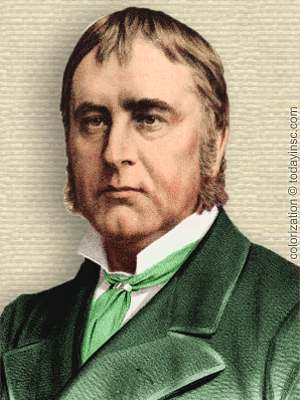
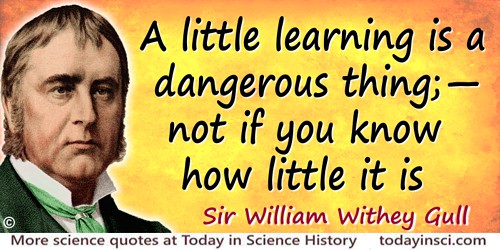
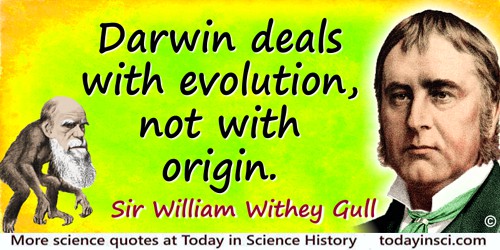
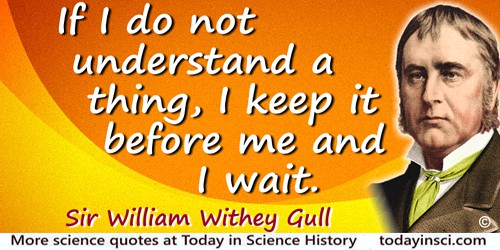
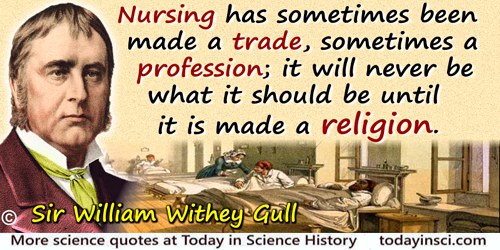
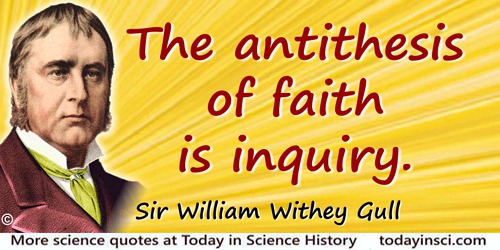
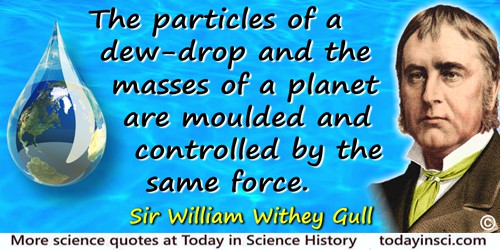
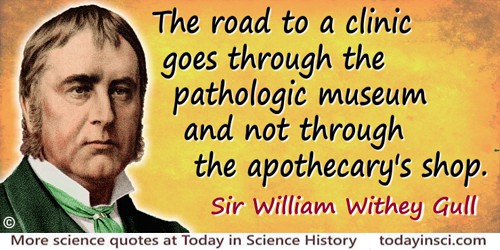
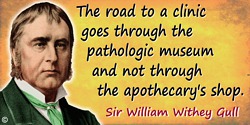
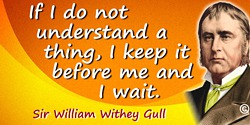
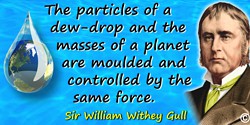
 In science it often happens that scientists say, 'You know that's a really good argument; my position is mistaken,' and then they would actually change their minds and you never hear that old view from them again. They really do it. It doesn't happen as often as it should, because scientists are human and change is sometimes painful. But it happens every day. I cannot recall the last time something like that happened in politics or religion.
(1987) --
In science it often happens that scientists say, 'You know that's a really good argument; my position is mistaken,' and then they would actually change their minds and you never hear that old view from them again. They really do it. It doesn't happen as often as it should, because scientists are human and change is sometimes painful. But it happens every day. I cannot recall the last time something like that happened in politics or religion.
(1987) -- 


